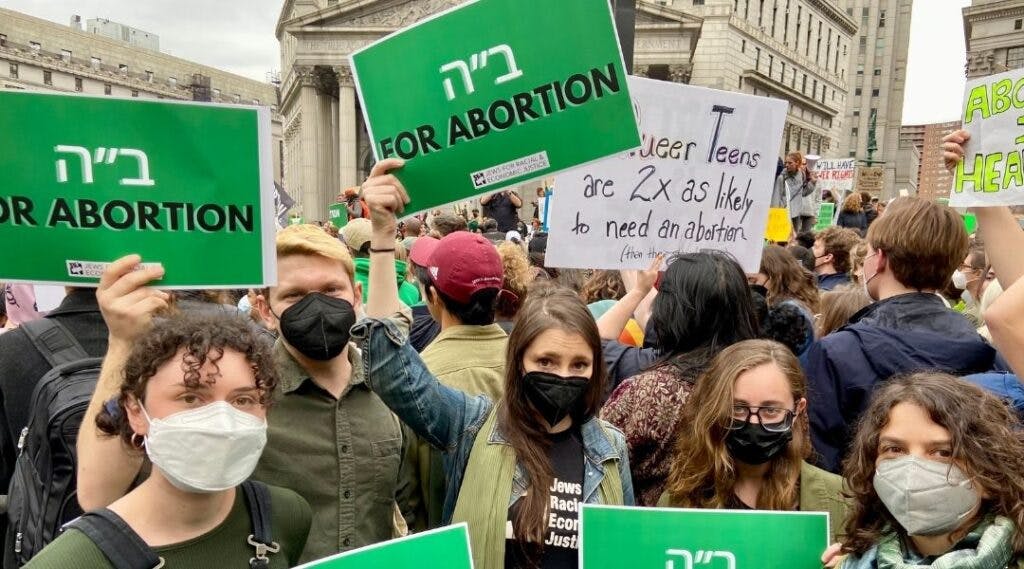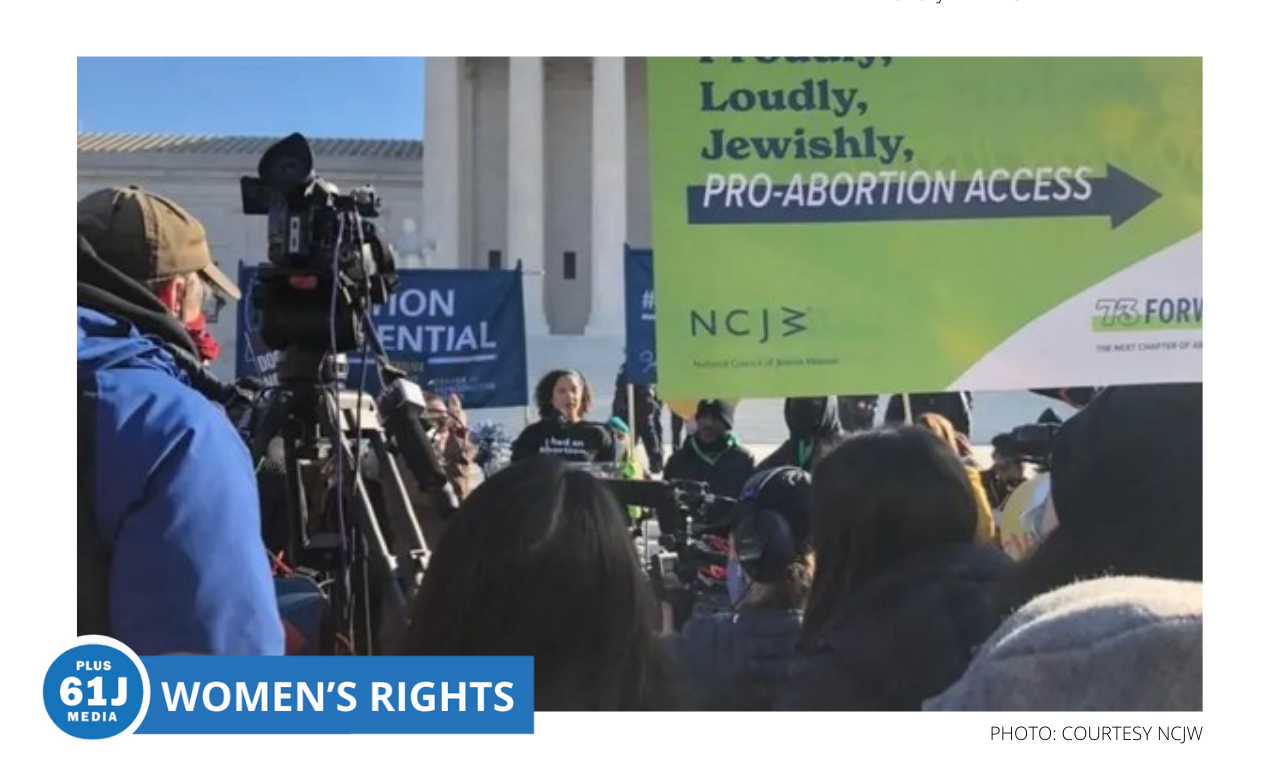Published: 10 May 2022
Last updated: 4 March 2024
DAN COLEMAN: All three Jewish Supreme Court justices since Roe v Wade were pro-choice. As RBG declared, 'the decision is central to a woman’s wellbeing and dignity'
WHEN I LEARNED last week of the US Supreme Court’s impending ruling to overturn the landmark abortion rights decision Roe v Wade, my thoughts turned first to former Justice Ruth Bader Ginsburg. She must be rolling in her grave, I thought.
After all, it was Ginsburg’s untimely death during the final months of the Trump administration that opened the door for right-wing, anti-choice zealot Amy Coney Barrett to ascend to the court, locking in the fifth vote needed for this long-sought far-right goal.
In writing this column, I must start with an acknowledgment that I am cis male, someone who could never face pregnancy let alone the need for an abortion. But I also write as someone who could not condone returning to a society in which women are second-class citizens. Reproductive freedom may be a matter of human rights, but, when abortion is banned, it is women, especially poor women, who will bear the brunt.
And the burden on women in American red states should not be underestimated: education and careers cut short, teenage girls forced to bear the children of rapists or family members, women losing their lives through back-alley abortions or life-threatening pregnancies. And those who obtain illegal abortions could wind up in prison. Already, a bill classifying abortion as homicide is moving through the Louisiana state legislature.
Our Jewish values compel us to support full access to safe and legal abortion care as basic health care.
Sheila Katz, NCJW, US
Yet it is women who are erased from Justice Samuel Alito’s draft ruling, which was leaked last week to great uproar (“an astonishing breach of norms,” said Washington Post columnist Ruth Marcus). Alito does not mention the conclusion joined by three Republican appointed justices in 1992 that women’s control of their reproduction is essential for them to “participate equally in the economic and social life of the nation”.
Alito insists that the US has “an unbroken tradition of prohibiting abortion on pain of criminal punishment”, thereby erasing the past six decades of hard-won progress on women’s rights. In the judicial arena, many of those victories came via the brilliance and persistence of Justice Ginsburg.
Her views on abortion were straightforward, as she told the New York Times in 2009: "the basic thing is that the government has no business making that choice for a woman".
There are many Jewish leaders and Jewish organisations ready to follow in Ginsburg’s footsteps. As Meredith Jacobs, CEO of Jewish Women International, wrote in the Forward “Jewish women are on the frontlines of the fight for abortion rights. We can’t give up hope now.”
Sheila Katz, CEO of the National Council of Jewish Women, wrote “our Jewish values compel us to support full access to safe and legal abortion care as basic health care.” The NCJW is planning an “abortion justice” rally in Washington on May 17.
“We will fight for abortion rights with all of our strength,” said Rabbi Rick Jacobs, leader of the Reform movement
Jacobs, Katz, and Jacobs are hardly alone. According to Pew Research, 83% of American Jews believe abortion should be legal in all or most cases. Pew also found that a comparably large number of Jews support the constitutional separation of church and state.

The First Amendment of the Constitution protects religious minorities from the impositions of the majority religion. In the US, as in Australia, that religion is Christianity. Four hundred years ago, many fled Europe to the US explicitly to escape religious persecution.
Their views informed the writing of the constitution, enshrining the principle of separation of church and state that protects Jews from Christian prayer in public schools and, at the present, from Christian belief dictating policy on abortion and other matters.
Thus, while Rabbi Danny Schiff’s recent discussion in The Jewish Independent of Jewish views on abortion may be important for individual and community deliberations, in the American context, religious views should have no bearing on the question of legality.
Unfortunately, the far-right majority of the Supreme Court has few scruples about mixing religion and jurisprudence. Justice Coney Barrett is a case in point. Her 2020 appointment to the court was characterised by the New York Times as “considered a home run by conservative Christians and anti-abortion activists".
Coney Barrett, whose church is associated with the Catholic charismatic revival movement, told University of Notre Dame law graduates in 2009: “if you can keep in mind that your fundamental purpose in life is not to be a lawyer, but to know, love and serve God, you truly will be a different kind of lawyer”. As her long-time mentor Judge Patrick J. Schiltz put it, “her religious convictions are pro-life, and she lives those convictions”.
Tellingly, the Alito draft repeatedly refers to the embryo or foetus as “an unborn human being”, a phrase borrowed from the Mississippi legislation that is under review. Yet, the view of the foetus as an unborn child is not a scientific or objective one. For the religious right it is a matter of faith that life begins at conception and that, therefore, abortion is murder.
It is this view that informs the justices as well as the religious extremists who promoted their ascension to the court. Viewing the foetus as a human being affords it all the rights of a person, rights comparable to those of its mother. Thus, in post-Roe America, women lose control of their own bodies and thereby control of their own lives. They are deprived of full agency in “the social life of the nation”.
This is the point that most Jewish commentators agree is at the heart of the Jewish position. As Sarah Seltzer, an editor at the Jewish feminist journal Lilith put it, “in Jewish tradition, the pregnant person’s needs are central to the moral equation”.
In Seltzer’s view, Jewish texts “consistently prioritise the ultimate well-being of the pregnant person over that of the foetus.”
Notably, all three Jewish Supreme Court justices who have served since the Roe v Wade decision (Ginsburg, Stephen Breyer, and Elena Kagan) are strong supporters of reproductive freedom.
More than 1000 rabbis have joined the National Council of Jewish Women’s project Rabbis for Repro. Under the banner “reproductive freedom is a Jewish value”, they declare that “our tradition has long protected this right in sharp contrast to those who use religion as justification for restriction”.
But, in the end, the last word should not go to rabbis or Talmudic scholars. Nor will it stay forever in the hands of fundamentalist Christians. Let us leave it rather with Ruth Bader Ginsburg, who declared “the decision whether or not to bear a child is central to a woman’s life, to her wellbeing and dignity. It’s a decision she must make for herself.”
Photo: National Council of Jewish Women protest in Washington (Courtesy NCJW)




